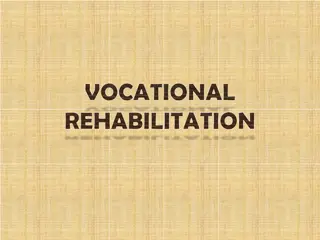The Role of Professional Builders in National Vocational Qualifications Framework
The National Vocational Qualifications Framework (NVQF) enhances the quality of skills and competencies in various sectors like construction, hospitality, and more. Learn how NVQs are achieved and the advantages they offer in upskilling and improving career progression.
Download Presentation

Please find below an Image/Link to download the presentation.
The content on the website is provided AS IS for your information and personal use only. It may not be sold, licensed, or shared on other websites without obtaining consent from the author.If you encounter any issues during the download, it is possible that the publisher has removed the file from their server.
You are allowed to download the files provided on this website for personal or commercial use, subject to the condition that they are used lawfully. All files are the property of their respective owners.
The content on the website is provided AS IS for your information and personal use only. It may not be sold, licensed, or shared on other websites without obtaining consent from the author.
E N D
Presentation Transcript
THE ROLE OF PROFESSIONAL BUILDERS IN THE ROLE OF PROFESSIONAL BUILDERS IN NATIONAL VOCATIONAL QUALIFICATIONS NATIONAL VOCATIONAL QUALIFICATIONS FRAMEWORK (NVQF FRAMEWORK (NVQF) ) By Bldr. Anthony A. Okwa (fniob) & Bldr. Jibrin Musa (Mniob)
INTRODUCTION What is NVQF? The NVQF is a system for The development, classification and recognition of skills, knowledge and competencies acquired by individuals, irrespective of where and how the training or skill was acquired. NVQs are work-related, competence- based qualifications, that reflect the skills, knowledge and understanding needed for entry and progression in employment NVQs are based on national standards for various occupations. The standards describe what a competent person in a job should be able to do well.
OBJECTIVES OF THE NVQF The main objective is to; Enhance quality Accountability Transparency Access progression And comparability of qualifications in relation to existing and future labour market human capital needs.
HOW NVQs ARE ACHIEVED To achieve an NVQ, a candidate must prove that he has the ability (competence) to perform the stipulated skills tasks at the appropriate level, to the required standard. Nigeria has identified the key sectors with sizable demand for vocational trades as initial focus areas. These include; Construction Hospitality - hotel and tourism Power Oil and gas Health Clothing Textiles and Leather works
ADVANTAGES OF NVQF Provides the criteria against which standards for graduation, job entry, career progression and remuneration could be gauged easily and fairly; Standardizes learning outcomes, competencies to be attained and demonstrated; Strengthens the linkage between skills training provider on the one hand, and industry on the other; Determines convenient systems for recognition of prior achievement; Expands access to education particularly lifelong learning; Provides a system for upskilling, reskilling etc. of Nigerian youth and working adult.
STRUCTURE FOR THE PROPOSED NVQ FRAMEWORK CERTIFIED PROFESSIONAL EDUCATIONAL INDUSTRY POSTGRADUATE NVQ LEVEL 6 NVQ LEVEL 5 HND/DEGREE NATIONAL EDUCATIONAL SYSTEM/STANDARDS ND/NID/ANTC/ANBC NVQ LEVEL 4 NTC/NBC/NVC 3/ TRADE TEST 1 NVQ LEVEL 3 NVC 2, TRADE TEST 2 NVQ LEVEL 2 PRE- VOCATIONAL NVQ LEVEL 1 JSS3, NVC 1& TRADE TEST 3
ROLES AND RESPONSIBILITIES UNDER THE NVQF The NVQ code of practice, guidelines, roles and responsibilities, identifies and spells out four key players in the NVQ hierarchy: The Training Provider The Awarding Body The Sector Skills Council The Regulatory Body
REQUIREMENT TO OPERATE NVQ TRAINING CENTRES One NVQ assessor for every six NVQ candidates One internal verifier for every ten assessors A centre co-ordinator to manage the registration of NVQ candidates and to request certificates. A placement officer who manages relationship with industries The required financial resources, The required structures. (Lesson rooms, offices, counselling rooms, library, record room, etc.) ICT facilities. Agreement with industries for candidates work placement (industry Bank)
REQUIREMENT FOR AN AWARDING BODY Adequate and qualified human resources (external verifiers, monitoring officers, information officers, industry liaison officers, etc) Robust certification system Robust Data base iv. Standards and Qualification. v. Effective governance, leadership and management, which will support the delivery of NVQs vi. A robust quality framework that ensures quality product is delivered to the candidate vii.Approved governance structure.
REQUIREMENT FOR A SECTOR SKILLS COUNCIL Research Officers Quality Assurance Managers Master Trainers Industrial Liaison Officers Robust Data Base ICT personnel Effective leadership and Governance Structure Required financial resources.
REQUIREMENTS OF A REGULATORY BODY Adequate and qualified human resources (external verifiers, monitoring officers, information officers, Statisticians, qualification officers, etc.) Robust Data base National Occupational Standards (NOS) Effective governance, leadership and management, which will support the delivery of NVQs A robust quality framework that ensures quality product is delivered to the candidate Approved governance structure.
CONCLUSION The NVQ offers a new vista of opportunities for the professional builder to work as Trainers Master Trainers Assessors Verifiers Moderators Research Officers Quality Assurance Managers Center Managers, etc























